All in the Family

Kalynne, Kiera, Kobe, Kaleb, Kieran and Kyle Harris are only 5 years old, but they have already made history. In 2001, their parents, Chris and Diamond, decided they wanted their son, Dewayne, to have a little brother or sister. "Dewayne was an only child, and he was getting older and he needed someone to play with. I didn't want him to be left alone," Diamond says.
After having problems conceiving, Diamond visited a local fertility clinic where she underwent artificial insemination. Soon, their prayers were answered—Diamond and Chris found out they were expecting twins!
After having problems conceiving, Diamond visited a local fertility clinic where she underwent artificial insemination. Soon, their prayers were answered—Diamond and Chris found out they were expecting twins!
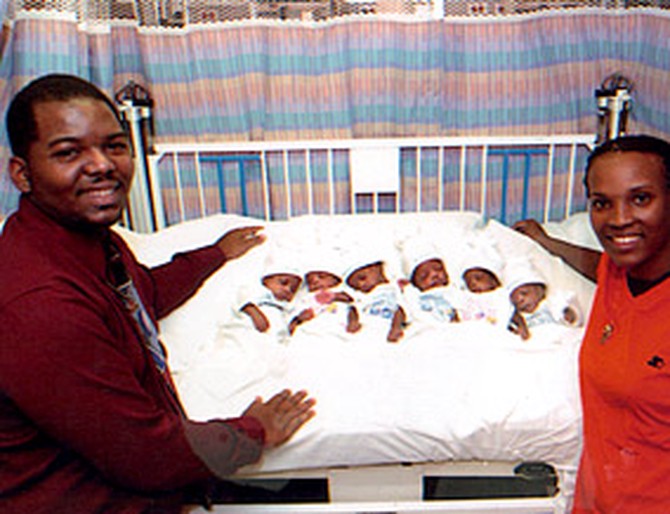
After a routine sonogram, Chris and Diamond got the shock of their lives. There were no longer two heartbeats—there were five! "I started getting hysterical. The doctors were trying to calm me down," she says. Diamond says she panicked so much that the doctors had to check her into the hospital that day.
Chris was equally as stunned. "I was like, 'Whoa. Five at one time? That's not even humanly possible,'" Chris says. "That's a litter!"
A few months later, Chris and Diamond welcomed five beautiful babies, Kalynne, Kiera, Kobe, Kaleb and Kieran. But the couple was in for yet another surprise…a sixth baby, Kyle, was hidden in the after birth.
Chris says the sextuplets were so small that they fit into the palm of his hand, and his wedding ring would fit around their tiny thighs. Since regular newborn clothes were much too big, the nurses at the hospital sewed little outfits—the size of doll clothes—for them to wear.
Although the babies were small, their birth was big news—they are the first set of surviving African-American sextuplets!
Chris was equally as stunned. "I was like, 'Whoa. Five at one time? That's not even humanly possible,'" Chris says. "That's a litter!"
A few months later, Chris and Diamond welcomed five beautiful babies, Kalynne, Kiera, Kobe, Kaleb and Kieran. But the couple was in for yet another surprise…a sixth baby, Kyle, was hidden in the after birth.
Chris says the sextuplets were so small that they fit into the palm of his hand, and his wedding ring would fit around their tiny thighs. Since regular newborn clothes were much too big, the nurses at the hospital sewed little outfits—the size of doll clothes—for them to wear.
Although the babies were small, their birth was big news—they are the first set of surviving African-American sextuplets!
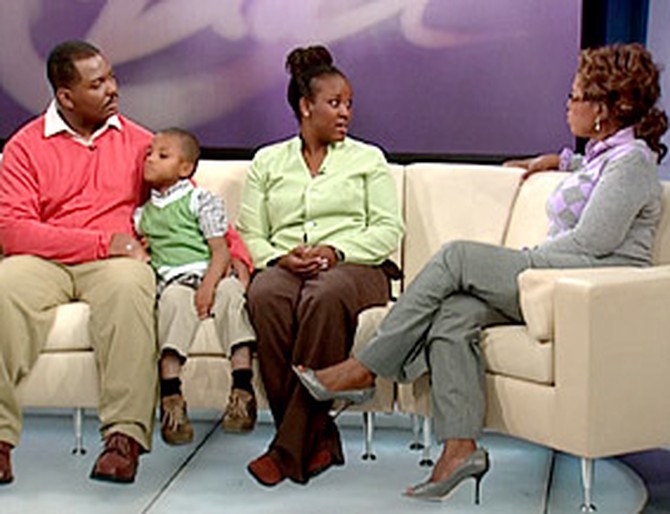
Raising six brand new babies isn't an easy task. Simply feeding them can
be a challenge—especially since Diamond decided to breast-feed all six! "The
doctor told me Mother Nature would take care of this all," she says. "I was
pumping about 50 to 60 bottles a day."
While both Chris and Diamond came from big families, taking care of so many kids has been an adjustment for them. They say family members gave them support, which helps them to raise their seven children on Chris's teacher's salary. As for private time, Chris says they have "absolutely none."
Having six brothers and sisters is a big change for Dewayne, too—he definitely isn't an only child anymore! "I like having more brothers and sisters, because ever since they were born, there's been a lot more people around the house to play with," he says.
While both Chris and Diamond came from big families, taking care of so many kids has been an adjustment for them. They say family members gave them support, which helps them to raise their seven children on Chris's teacher's salary. As for private time, Chris says they have "absolutely none."
Having six brothers and sisters is a big change for Dewayne, too—he definitely isn't an only child anymore! "I like having more brothers and sisters, because ever since they were born, there's been a lot more people around the house to play with," he says.
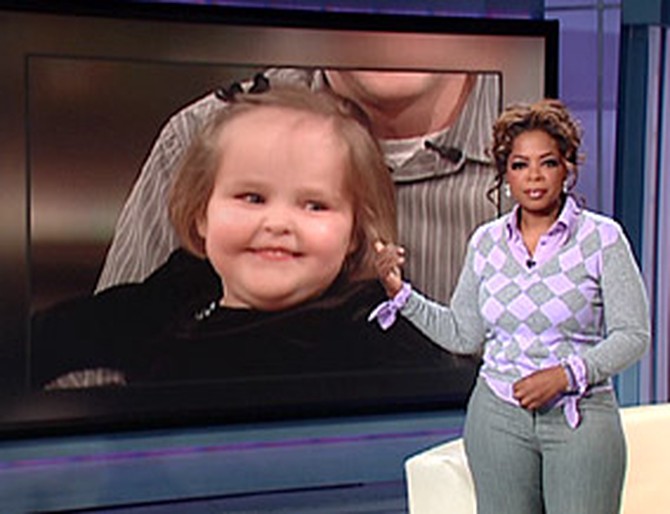
Conjoined twins Maliyah and Kendra Herrin made headlines around the world when they were successfully separated in August 2006. After the surgery, Kendra kept the one kidney the girls had shared, leaving Maliyah in desperate need for one of her own.
On April 3, 2007, the twins' mom, Erin, donated her right kidney to her 5-year-old daughter. Doctors carefully removed Erin's kidney, then reconstructed it to fit Maliyah's tiny body.
"It seemed to work almost immediately after the blood began to flow to it," says Dr. John Sorenson, her transplant surgeon. "Everything went very smoothly, as well as we could have possibly hoped for."
Maliyah's father Jake says he is very grateful. "[The doctors] perform miracle after miracle after miracle," he says. "Looking back, it's amazing how far we've come."
On April 3, 2007, the twins' mom, Erin, donated her right kidney to her 5-year-old daughter. Doctors carefully removed Erin's kidney, then reconstructed it to fit Maliyah's tiny body.
"It seemed to work almost immediately after the blood began to flow to it," says Dr. John Sorenson, her transplant surgeon. "Everything went very smoothly, as well as we could have possibly hoped for."
Maliyah's father Jake says he is very grateful. "[The doctors] perform miracle after miracle after miracle," he says. "Looking back, it's amazing how far we've come."
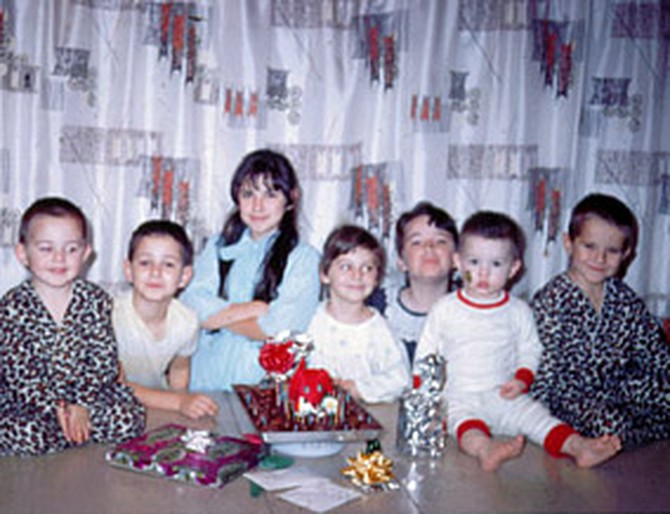
The eight Huckaby children—Jude, Joan, Jann, Jason, Janie, Jonathan, Jody and John Jr.—grew up in a small southern town. Raised in a close-knit, conservative Catholic home, the Huckabys' life centered on their family and their faith.
"All you had to do was walk in the house to know it. You saw statues of Jesus and Mary and Joseph and a whole bunch of saints," Jody says. "My parents showed all of us what it means to be family every day."
Every day the Huckaby children's father took them to school—and when they came home, their mom had cookies, cupcakes or other treats waiting. "We always felt as though [when] we went to bed at night, we had a good time," Jann says. "We had really lived a good day."
With all 10 family members living in a three bedroom, one bathroom house, space was a little tight. "It's kind of hard not to know what's going on with each other," Jonathan says.
"All you had to do was walk in the house to know it. You saw statues of Jesus and Mary and Joseph and a whole bunch of saints," Jody says. "My parents showed all of us what it means to be family every day."
Every day the Huckaby children's father took them to school—and when they came home, their mom had cookies, cupcakes or other treats waiting. "We always felt as though [when] we went to bed at night, we had a good time," Jann says. "We had really lived a good day."
With all 10 family members living in a three bedroom, one bathroom house, space was a little tight. "It's kind of hard not to know what's going on with each other," Jonathan says.
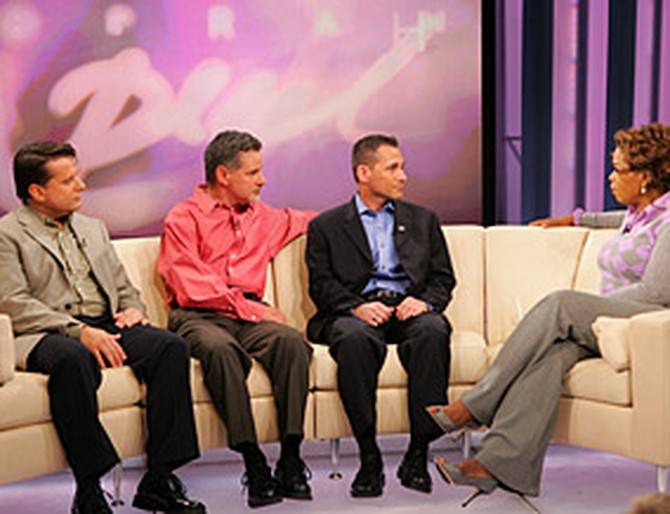
Despite their close upbringing, four of the Huckabys were hiding one important thing—they were gay. "I was first [to come out]," Jason says. "It was about 1985 and I was studying to be a Catholic priest. I'd been in seminary for a number of years, and I came to the point in my life where I realized that I didn't want to live my life alone, that I need today to have a partner in my life." So he wrote a letter to his parents, telling them he was gay.
After receiving the news, the Huckabys' parents told the other seven children about Jason's letter, and Jonathan says they were "not pleased." "Even though it was very scary, I trusted that there was enough of a solid foundation there that it would eventually be a safe thing for me to do, to come out to my family," Jason says.
Jonathan and Jody say as they grew up, they, too, realized they were gay. "If only we had been able to talk about it. There were no parameters. We went to Catholic school, and you certainly didn't talk about that with the nuns," Jody says. Their parents' reaction to Jason's letter made Jody concerned to come out, but eventually, he and Jonathan each admitted their secret. Jody says a fourth brother is also gay.
At first, even their other siblings rejected their lifestyle. Their sister, Jann, says it took her more than a year to fully accept it. "I had prayed about it, and I realized that I did not need to judge. I needed to love," Jann says. When their brother Jude first heard the news, he thought Jason had chosen to be gay. "After the other brothers came out, I said, 'This can't be a choice. This has to be…the way they were born,'" he says.
Jody, who is now the executive director of Parents, Families and Friends of Lesbians and Gays (PFLAG), says his organization helped his mother find peace with having four gay children. "For me, it's sort of a full-circle experience, because all these years later, I'm running this national organization, and it's for parents, it's for family members and friends and straight allies to deal with these issues," he says.
After receiving the news, the Huckabys' parents told the other seven children about Jason's letter, and Jonathan says they were "not pleased." "Even though it was very scary, I trusted that there was enough of a solid foundation there that it would eventually be a safe thing for me to do, to come out to my family," Jason says.
Jonathan and Jody say as they grew up, they, too, realized they were gay. "If only we had been able to talk about it. There were no parameters. We went to Catholic school, and you certainly didn't talk about that with the nuns," Jody says. Their parents' reaction to Jason's letter made Jody concerned to come out, but eventually, he and Jonathan each admitted their secret. Jody says a fourth brother is also gay.
At first, even their other siblings rejected their lifestyle. Their sister, Jann, says it took her more than a year to fully accept it. "I had prayed about it, and I realized that I did not need to judge. I needed to love," Jann says. When their brother Jude first heard the news, he thought Jason had chosen to be gay. "After the other brothers came out, I said, 'This can't be a choice. This has to be…the way they were born,'" he says.
Jody, who is now the executive director of Parents, Families and Friends of Lesbians and Gays (PFLAG), says his organization helped his mother find peace with having four gay children. "For me, it's sort of a full-circle experience, because all these years later, I'm running this national organization, and it's for parents, it's for family members and friends and straight allies to deal with these issues," he says.
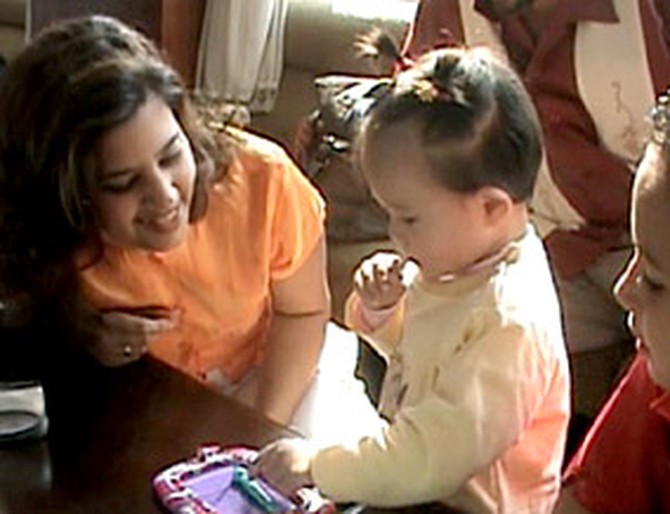
The story of two American families and two little girls named Mia may read like a Hollywood script, but this miraculous reunion really happened.
In July 2004, Holly and Doug Funk, an Illinois couple raising five children, decided to adopt a baby girl from China who had been abandoned at a textile factory. They named her Mia.
"When I received her in my arms the day that we got her, she captured my heart right away," Holly says. "I just wanted to take her home."
Hundreds of miles away in Florida, Diana and Carlos Ramirez, parents of two sons, were also making plans to adopt. "I've always dreamt of a little girl," Diana says. "I was happy with my two boys, but always felt like this emptiness, like I wanted a daughter."
Diana says she was instantly drawn to photos of a Chinese toddler who was born with a hole in her heart and abandoned as a newborn. The moment she saw this little girl, she says she knew what her name would be. "Something in my heart said, 'Name her Mia,'" she says.
In October 2005, Diana and her family traveled overseas to bring their 2-year-old daughter home. "Mia is everything to our family," she says. "She's just such an awesome joy."
In July 2004, Holly and Doug Funk, an Illinois couple raising five children, decided to adopt a baby girl from China who had been abandoned at a textile factory. They named her Mia.
"When I received her in my arms the day that we got her, she captured my heart right away," Holly says. "I just wanted to take her home."
Hundreds of miles away in Florida, Diana and Carlos Ramirez, parents of two sons, were also making plans to adopt. "I've always dreamt of a little girl," Diana says. "I was happy with my two boys, but always felt like this emptiness, like I wanted a daughter."
Diana says she was instantly drawn to photos of a Chinese toddler who was born with a hole in her heart and abandoned as a newborn. The moment she saw this little girl, she says she knew what her name would be. "Something in my heart said, 'Name her Mia,'" she says.
In October 2005, Diana and her family traveled overseas to bring their 2-year-old daughter home. "Mia is everything to our family," she says. "She's just such an awesome joy."
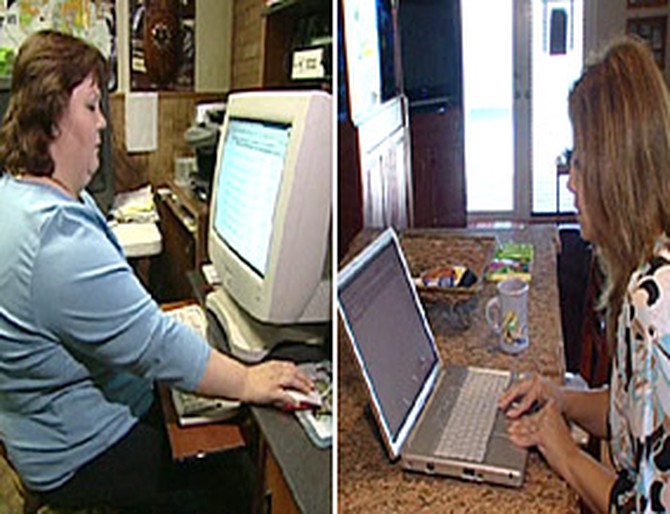
Holly, Diana and their adopted daughters were separated by hundreds of miles, but a common thread brought them together.
Though there are thousands of online adoption support groups open to parents, Holly and Diana happened to belong to the same one. In May 2006, Diana sent a message to her support group and told the other adoptive parents that her daughter Mia was turning 3 in June. Little did she know, this message would change her life forever.
When Holly read the posting, she says she thought it was a funny coincidence because her Mia was also going to be 3 in June. Holly responded to Diana's message and said her daughter's birthday was June 13th.
Diana quickly replied. "Are you kidding?" she wrote. "My Mia's going to be turning 3 on June 12. Where was she found?"
Through a series of e-mails, the adoptive mothers realized their daughters had been abandoned at the same factory, within one week of each other. When they compared photos of the girls, they knew there was more to the story and decided to do DNA testing.
Though there are thousands of online adoption support groups open to parents, Holly and Diana happened to belong to the same one. In May 2006, Diana sent a message to her support group and told the other adoptive parents that her daughter Mia was turning 3 in June. Little did she know, this message would change her life forever.
When Holly read the posting, she says she thought it was a funny coincidence because her Mia was also going to be 3 in June. Holly responded to Diana's message and said her daughter's birthday was June 13th.
Diana quickly replied. "Are you kidding?" she wrote. "My Mia's going to be turning 3 on June 12. Where was she found?"
Through a series of e-mails, the adoptive mothers realized their daughters had been abandoned at the same factory, within one week of each other. When they compared photos of the girls, they knew there was more to the story and decided to do DNA testing.
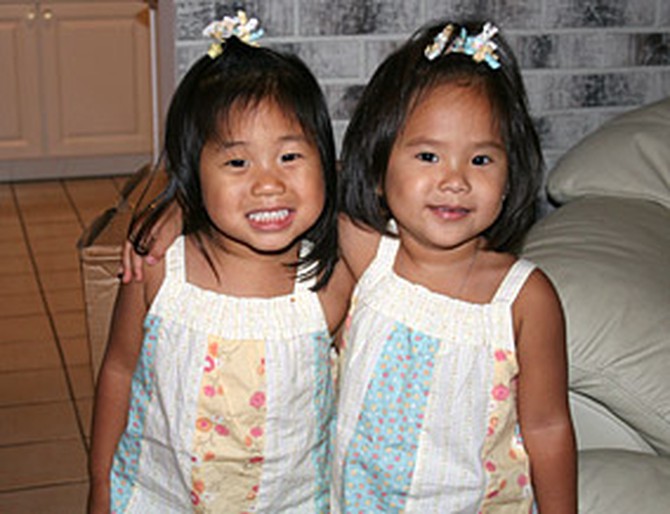
DNA tests concluded the two Mias are sisters! Without the birth parents, they can't determine whether the girls are twins, but Diana says it's pretty obvious that they are.
When Diana first heard that her daughter had a biological sibling living in the United States, she says she was in complete shock. "It's like an emotional roller coaster because first you think, 'Wow, can this really be?' And then you think, 'There's strings attached to this miracle,'" she says. "Then you think of God's awesomeness … and how he perfectly orchestrated everything to bring them together."
On August 18, 2006, the long-lost sisters were reunited in Chicago. Moments after meeting, they were walking through the airport, holding hands. "They had never met or seen each other before, but it was like an instant click," Diana says.
Holly and Diana aren't going to let their daughters lose touch a second time. The two Mias talk on the phone once a week, and the families plan to visit each other a few times a year. "Hopefully, [they'll] grow up to be great friends," Diana says. "Besides sisters, great friends."
When Diana first heard that her daughter had a biological sibling living in the United States, she says she was in complete shock. "It's like an emotional roller coaster because first you think, 'Wow, can this really be?' And then you think, 'There's strings attached to this miracle,'" she says. "Then you think of God's awesomeness … and how he perfectly orchestrated everything to bring them together."
On August 18, 2006, the long-lost sisters were reunited in Chicago. Moments after meeting, they were walking through the airport, holding hands. "They had never met or seen each other before, but it was like an instant click," Diana says.
Holly and Diana aren't going to let their daughters lose touch a second time. The two Mias talk on the phone once a week, and the families plan to visit each other a few times a year. "Hopefully, [they'll] grow up to be great friends," Diana says. "Besides sisters, great friends."
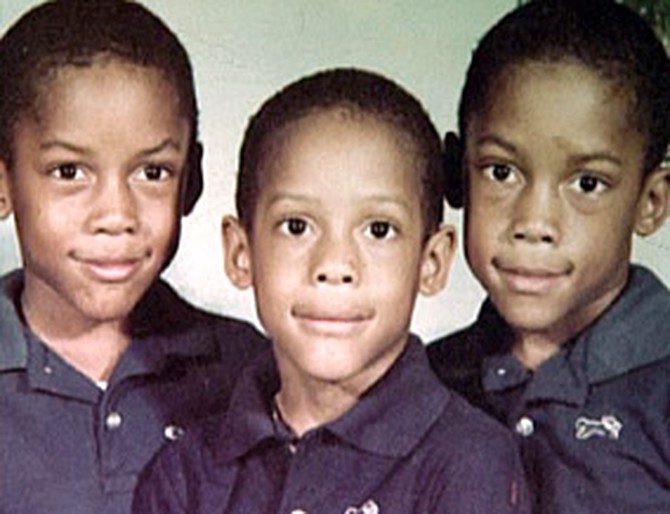
In Edwards, Mississippi—population 1,300—Kenya, Deshon and Warren are known as the "Martin triplets." Thanks to an inspiring upbringing, these young men have come a long way from their humble beginnings.
From the time the triplets were old enough to remember, they say education and faith have been the cornerstones of their household. "Our mom kept us in three places," Deshon says. "She kept us at church, she kept us at the house and at school. She was determined to make sure that we succeeded."
After the boys' father died when they were 10 years old, their mother, Elinder, became the primary caregiver for the triplets and their two older brothers. Though she struggled to make ends meet, she never let her sons take their education for granted. The day after their father died, Warren says his mother made certain her sons were in class. "Amid the weeping, amid the tears, the crying, the sorrow, she looked all three of us in the eyes and said, 'You're going to school,'" he remembers.
The triplets' education did not stop when they got home from school. Elinder, a language arts and reading teacher, made her sons memorize state capitals and multiplication tables before they could play outdoors. "Once we had them memorized, we could go outside, ride our bikes," Kenya says. "[As we rode,] we would sing our multiplication facts to each other."
"Mom was just determined to not let us become a statistic," Deshon says. "She was determined to make sure we succeeded and that we got out of this ghetto."
From the time the triplets were old enough to remember, they say education and faith have been the cornerstones of their household. "Our mom kept us in three places," Deshon says. "She kept us at church, she kept us at the house and at school. She was determined to make sure that we succeeded."
After the boys' father died when they were 10 years old, their mother, Elinder, became the primary caregiver for the triplets and their two older brothers. Though she struggled to make ends meet, she never let her sons take their education for granted. The day after their father died, Warren says his mother made certain her sons were in class. "Amid the weeping, amid the tears, the crying, the sorrow, she looked all three of us in the eyes and said, 'You're going to school,'" he remembers.
The triplets' education did not stop when they got home from school. Elinder, a language arts and reading teacher, made her sons memorize state capitals and multiplication tables before they could play outdoors. "Once we had them memorized, we could go outside, ride our bikes," Kenya says. "[As we rode,] we would sing our multiplication facts to each other."
"Mom was just determined to not let us become a statistic," Deshon says. "She was determined to make sure we succeeded and that we got out of this ghetto."
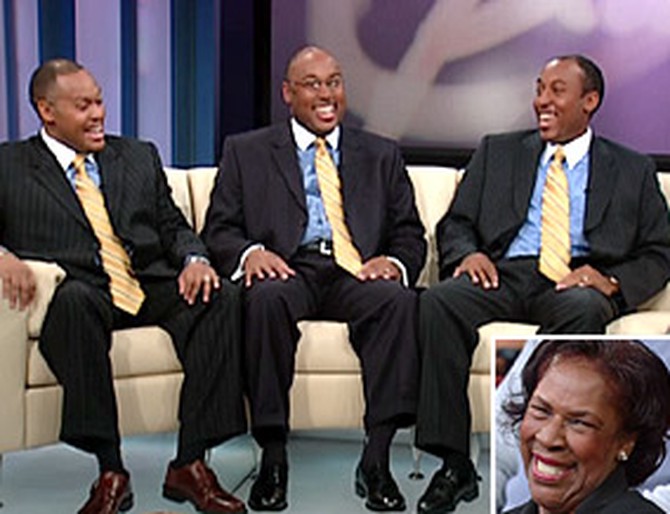
Not only did the Martin brothers succeed—they soared. The triplets finished high school at the top of their class. Then, they followed their older brother Ivan to Jackson State University, where Kenya and Warren graduated as valedictorians and Deshon finished with a 3.9 grade point average.
After college, the triplets went on to graduate from the School of Law at the University of Mississippi. Now, at 28 years old, they are practicing attorneys in their home state.
All of Elinder's hard work has paid off. Her five sons are all college graduates. What's her parenting secret? "A lot of praying," she says. "As the boys said, I integrated church, school and home. Home first. School second. And then church. … I lived it, demonstrated it [and] modeled it."
Ivan, the oldest Martin son, says he tried to set a positive example for his brothers after their father passed away. "Ivan and [our other brother] were more so like father figures than brothers," Kenya says.
Now, the Martin triplets are setting an example for future generations. When they graduated from law school, they pledged to donate $1 million to their alma mater, Jackson State University. This money will be used to establish educational scholarships for incoming students.
"You've proven what can be done," Oprah tells the Martin family.
After college, the triplets went on to graduate from the School of Law at the University of Mississippi. Now, at 28 years old, they are practicing attorneys in their home state.
All of Elinder's hard work has paid off. Her five sons are all college graduates. What's her parenting secret? "A lot of praying," she says. "As the boys said, I integrated church, school and home. Home first. School second. And then church. … I lived it, demonstrated it [and] modeled it."
Ivan, the oldest Martin son, says he tried to set a positive example for his brothers after their father passed away. "Ivan and [our other brother] were more so like father figures than brothers," Kenya says.
Now, the Martin triplets are setting an example for future generations. When they graduated from law school, they pledged to donate $1 million to their alma mater, Jackson State University. This money will be used to establish educational scholarships for incoming students.
"You've proven what can be done," Oprah tells the Martin family.
Published 04/10/2007

